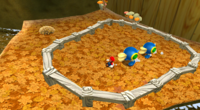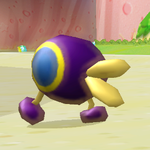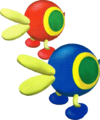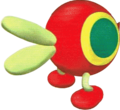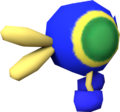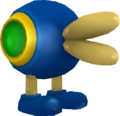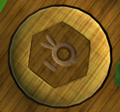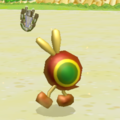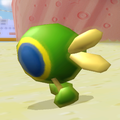Cataquack
| Cataquack | |||
|---|---|---|---|
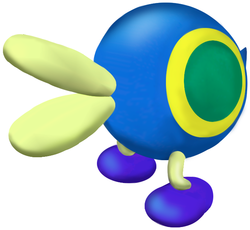 Artwork from Super Mario Sunshine | |||
| First appearance | Super Mario Sunshine (2002) | ||
| Latest appearance | Super Mario 3D All-Stars (2020) | ||
| |||
| |||
| |||
- “Those large-billed Cataquacks tend to be very territorial. So, when they spot an outsider such as yourself, they go wild! They'll run up and hurl you into the air, but they mean no harm.”
- —Noki, Super Mario Sunshine
Cataquacks, also called Paihanas,[1] Piahanas,[2] or Pihanas,[3] are duck-like enemies that first appear in Super Mario Sunshine. They are known for catapulting Mario or other characters into the air. Blue Cataquacks are said to become nervous when confronted by strangers, but they never want to harm them; however, a red variant called Chuhanas[1] or Red Cataquacks[4] harms any strangers that are in its way. Their name is likely a portmanteau of "catapult" and "quack," referring to their behavior and appearance (similar to a duck), respectively. Cataquacks resemble Wiggler segments, not unlike Plungelos, and they are further connected by their similar location and Japanese names. Enemies with similar functions, called Heave-Hos, appear in Super Mario 64.
History[edit]
Super Mario series[edit]
Super Mario Sunshine[edit]
In Super Mario Sunshine, Cataquacks come in red and blue varieties. They walk aimlessly on Gelato Beach, but when they sense Mario nearby, they charge at him until he gets far enough away from them or they reach a ledge or water. If Cataquacks make contact, they use their beaks to throw Mario into the air. This can be both helpful and harmful; Mario can sustain damage if he lands on the same ground from which he was launched, but he can also reach platforms and coins he otherwise could not with normal jumps. Whenever Mario gets launched in the air by a Cataquack, he screams the same way he does when falling a great distance instead of when getting tossed in other ways, such as getting launched by chucksters. Cataquacks are usually not affected by Mario's direct attacks, but when sprayed with FLUDD, they flip over and become stunned. During this time, Mario can get a coin from a Cataquack by jumping onto it, causing it to sink into the ground. If he sprays a stunned Cataquack, it remains stunned for a longer time. When sprayed over sand, Cataquacks sink into it without having to jump on them, but they do not give a coin. Cataquacks can be defeated only by eating them with a Yoshi, catapulting them into the air with the outburst of a nearby Dune Bud, or luring them towards water while using the Hover Nozzle.[5] A subspecies of Cataquacks called Plungelos appears as mini-bosses in Episode 2 of Gelato Beach. Cataquacks can also appear in Sirena Beach's fifth episode, King Boo Down Below, where if King Boo spins three question marks on the slot machines, he may spit out two Blue Cataquacks that disappear after a short time.
The differently colored Cataquacks act differently from one another, similarly to most other species. Blue Cataquacks cannot damage Mario unless he touches them directly, but red ones can damage Mario by catapulting him. If swarmed by Red Cataquacks, Mario may become trapped in a loop of catapulting and suffer a large amount of damage, possibly up to the point that he loses a life. Blue Cataquacks tend to be calmer, and they fall asleep if left undisturbed. According to a Noki on Gelato Beach, Red Cataquacks are new to the area.[6] As the player progresses through Gelato Beach's episodes, the number of Red Cataquacks and Cataquacks in general increases, while the number of Blue Cataquacks decreases. By the eighth episode, The Watermelon Festival, only one Blue Cataquack remains, sleeping atop a palm tree away from the beach, and Mario can obtain a Blue Coin from the Cataquack while it is overturned; conversely, in the first episode, Dune Bud Sand Castle Secret, Mario can get a Blue Coin by overturning the single Red Cataquack and jumping on it. In The Watermelon Festival, Red Cataquacks swarm most of Gelato Beach, increasing the difficulty of bringing the watermelon to the Surf Cabana. If the watermelon hits a Cataquack, it is thrown upwards and destroyed when it hits the ground, leaving a coin behind.
Blue Cataquacks are one of the few enemies in the game confirmed to be native to Isle Delfino, as most of the others (presumably including Red Cataquacks) were created from Shadow Mario's graffiti.[7] Despite this, both colors of Cataquacks splatter when defeated from a Dune Bud.
Super Mario Galaxy[edit]
In Super Mario Galaxy, the blue variety of Cataquacks reappears in the Gold Leaf Galaxy and the Beach Bowl Galaxy. Mario can use them to fling himself to high or out-of-reach places. Honeybees are seen to keep them as pets, fencing them in. In this game, they can be defeated only by luring them into the water, where they vanish, but they reappear shortly after (along with Koopa Troopas, they are the only enemies that respawn). If Mario spins next to them, ground-pounds near them, or touches them while in his Rainbow form, they will flip over and be stunned for a few seconds. Unlike in Super Mario Sunshine, Cataquacks are completely harmless due to the game's lack of falling damage. Additionally, these Cataquacks jump and give out an excited squeak before chasing, rather than immediately pursuing Mario. They have a very slight redesign in that the yellow circles on their sides are now a defined ridge rather than simply a pattern, lessening the resemblance to Wiggler segments. According to a honeybee in the Gold Leaf Galaxy, Cataquacks (or at least one specimen found nearby) are native to the Flower Planet.[8]
Additionally, the flag on the Sea Slide Galaxy tower depicts a seagull with a stylized head that resembles a Cataquack's.[9]
Mario Kart series[edit]
In the Mario Kart series, Cataquacks physically appear only on the course Peach Beach, introduced in Mario Kart: Double Dash!! and returning in Mario Kart Wii. Cataquacks are given additional purple and green varieties in addition to the original two varieties. They walk on the beach and target karts like in Super Mario Sunshine, but they avoid the stone path in between the grass and the beach. If a kart runs into them, it is thrown upwards, removing all of its speed and making the drivers drop their items. Cataquacks can be temporarily knocked out by Green Shells and Red Shells, as well as Lightning. Differences with Cataquacks in Mario Kart Wii include having an exclamation point appear above one's head upon being alerted to passing karts, being able to trespass the stone path between grass and sand, and being stunned by a POW Block, a Mega Mushroom, or a Bullet Bill, none of which are in Mario Kart: Double Dash!! Additionally, Cataquacks do not give chase in Time Trial (or Nintendo Wi-Fi Connection before the service had been discontinued).
In Mario Kart Arcade GP and Mario Kart Arcade GP 2, Red and Blue Cataquacks appear in the backgrounds of certain courses in the Mario Cup.[10]
List of appearances by date[edit]
| Title | Description | Release | System/format |
|---|---|---|---|
| Super Mario Sunshine | Enemy | Japan: July 19, 2002 |
GameCube |
| Mario Kart: Double Dash!! | Obstacle | Japan: November 7, 2003 |
GameCube |
| Super Mario Galaxy | Enemy | Japan: November 1, 2007 |
Wii |
| Mario Kart Wii | Obstacle | Japan: April 10, 2008 |
Wii |
| Super Mario 3D All-Stars | Enemy | Japan: September 18, 2020 |
Switch |
Gallery[edit]
Artwork from Super Mario Sunshine
Course preview banner for Peach Beach from Mario Kart: Double Dash!!
Key art from Mario Kart Arcade GP
Challenge icon from Mario Kart Arcade GP 2
Model from Super Mario Galaxy
Cataquack launch pad in the Gold Leaf Galaxy from Super Mario Galaxy
Screenshot of a Red Cataquack from Mario Kart Wii
Names in other languages[edit]
| Language | Name | Meaning | Notes |
|---|---|---|---|
| Japanese | ポイハナ[?] Poihana |
From「ポイ」(poi, onomatopoeia for tossing) and「 |
|
| あおポイハナ[11] Ao Poihana |
Blue Cataquack | Super Mario Sunshine | |
| あかポイハナ[11] Aka Poihana |
Red Cataquack | Super Mario Sunshine | |
| Chinese | 咻地[?] Xiū de |
Thrown | |
| French | Catacouac[?] | From the English name | |
| German | Kataquax[?] | Similar to the English name | |
| Italian | Catapapero[?] | From catapulta ("catapult") and papero ("duck") | |
| Korean | 날꽃[?] Nalkkot |
From "날다" (nalda, "to fly") and "꽃충이" (Kkotchung-i, "Wiggler") | |
| Spanish | Picocuac[?] | From pico ("beak") and cuac (onomatopoeic term meaning "quack") |
References[edit]
- ^ a b Bogenn, Tim, and Doug Walsh (2002). Super Mario Sunshine Official Strategy Guide. BradyGAMES (American English). ISBN 0-7440-0180-3. Page 6.
- ^ Bogenn, Tim, and Doug Walsh (2002). Super Mario Sunshine Official Strategy Guide. BradyGAMES (American English). ISBN 0-7440-0180-3. Page 103.
- ^ Hodgson, David S J, Bryan Stratton, and Stephen Stratton (September 3, 2002). Super Mario Sunshine Prima's Official Strategy Guide. Prima Games (American English). ISBN 0-7615-3961-1. Page 19.
- ^ Averill, Alan, and Jennifer Villarreal (2002). Super Mario Sunshine Player's Guide. Nintendo of America (American English). ISBN 1-930206-23-2. Page 63.
- ^ BeaverThingify (September 15, 2020). Super Mario Sunshine - Killing every Cataquack in "The Watermelon Festival". YouTube. Retrieved January 6, 2021.
- ^ "Watch out for the red Cataquacks! Seriously! They can hurt you. They only appeared on this beach recently." – Noki. Super Mario Sunshine.
- ^ An excerpt of page 107 of the Encyclopedia Super Mario Bros. The title of the box is 「クッパ
Jr .の落書 き!」 ("The graffiti of Bowser Jr.!") and the text says 「本 作 の敵 キャラクターたちは、クッパJr.が落書 きで生 み出 したという設定 。そのため、水 に弱 かったり、デザインが他 のシリーズと少々 異 なっていたりする。ヨッシーも、同様 の理由 で水 に落 ちると消 えてしまう。」 ("This game's enemy characters are created by Bowser Jr.'s graffiti. That is why they are weak to water, and differ slightly in design from the rest of the series. Yoshi also vanishes if he falls in water for the same reason.") - ^ Screenshot
- ^ July 21, 2021. The tower in Sea Slide Galaxy in Super Mario Galaxy is decorated with a flag on the roof. The flag depicts a stylized seagull eating a mushroom.. Supper Mario Broth. Retrieved August 8, 2021.
- ^ RobertoLPDX (June 28, 2015). Let's Play: Mario Kart Arcade GP 2 (Longplay). YouTube (English). Retrieved May 24, 2024.
- ^ a b October 10, 2002. 「スーパーマリオサンシャイン
任天堂 公式 ガイドブック」 (Super Mario Sunshine Nintendo Kōshiki Guidebook). Shogakukan (Japanese). ISBN 4-09-106064-1. Page 18.

